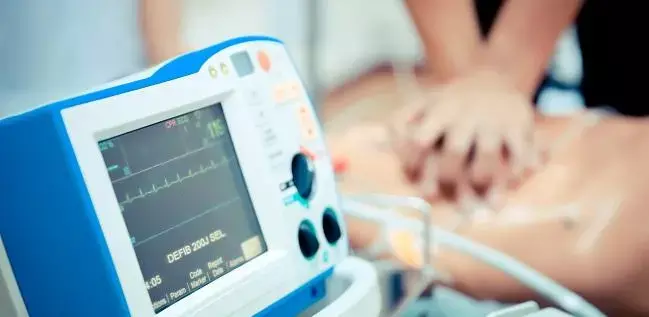- Home
- Medical news & Guidelines
- Anesthesiology
- Cardiology and CTVS
- Critical Care
- Dentistry
- Dermatology
- Diabetes and Endocrinology
- ENT
- Gastroenterology
- Medicine
- Nephrology
- Neurology
- Obstretics-Gynaecology
- Oncology
- Ophthalmology
- Orthopaedics
- Pediatrics-Neonatology
- Psychiatry
- Pulmonology
- Radiology
- Surgery
- Urology
- Laboratory Medicine
- Diet
- Nursing
- Paramedical
- Physiotherapy
- Health news
- Fact Check
- Bone Health Fact Check
- Brain Health Fact Check
- Cancer Related Fact Check
- Child Care Fact Check
- Dental and oral health fact check
- Diabetes and metabolic health fact check
- Diet and Nutrition Fact Check
- Eye and ENT Care Fact Check
- Fitness fact check
- Gut health fact check
- Heart health fact check
- Kidney health fact check
- Medical education fact check
- Men's health fact check
- Respiratory fact check
- Skin and hair care fact check
- Vaccine and Immunization fact check
- Women's health fact check
- AYUSH
- State News
- Andaman and Nicobar Islands
- Andhra Pradesh
- Arunachal Pradesh
- Assam
- Bihar
- Chandigarh
- Chattisgarh
- Dadra and Nagar Haveli
- Daman and Diu
- Delhi
- Goa
- Gujarat
- Haryana
- Himachal Pradesh
- Jammu & Kashmir
- Jharkhand
- Karnataka
- Kerala
- Ladakh
- Lakshadweep
- Madhya Pradesh
- Maharashtra
- Manipur
- Meghalaya
- Mizoram
- Nagaland
- Odisha
- Puducherry
- Punjab
- Rajasthan
- Sikkim
- Tamil Nadu
- Telangana
- Tripura
- Uttar Pradesh
- Uttrakhand
- West Bengal
- Medical Education
- Industry
Survival After Cardiac Arrest Low among Hospitalized COVID 19 Patients: JAMA

Anecdotal reports of poor outcomes in critically ill patients with covid-19 who have had in-hospital cardiac arrest have prompted discussions on the futility of cardiopulmonary resuscitation in this patient population. Adding a further value, a recent study suggests that survival after in-hospital cardiac arrest was roughly one-third lower in patients with COVID-19 infections compared to uninfected patients. The research paper was published in the JAMA Network Open on March 02, 2022.
Whether the poor in-hospital cardiac arrest (IHCA) survival rate reported in earlier studies is broadly representative of patients with COVID-19 in US hospitals remains unknown. Therefore, Dr Saket Girotra and his team conducted a study to examine the association of COVID-19 infection with survival outcomes of US adults after IHCA.
In this study, the researchers used data from the American Heart Association Get With the Guidelines–Resuscitation (GWTG-R) registry, which contains detailed information on patients who experience cardiac arrest at participating hospitals in the United States. The researchers included 24,915 patients aged 18 years and older from 286 hospitals who experienced IHCA during March–December 2020. The major outcomes assessed were survival to discharge and return of spontaneous circulation (ROSC) for at least 20 minutes.
Key findings of the study:
- Among 24,915 patients 5,916 patients (23.7%) had suspected or confirmed COVID-19 infections.
- The researchers noted that the patients with COVID-19 were younger, more frequently men and of the Black race, and more likely to have an initial non-shockable rhythm, pneumonia, respiratory insufficiency, or sepsis and be receiving mechanical ventilation and vasopressors at the time of IHCA.
- Upon analysis, they found that the survival rates to hospital discharge were 11.9% for COVID-19 patients, compared with 23.5% for noninfected patients (adjusted relative risk, 0.65).
- They noted that ROSC was 53.7% and 63.6% for infected and noninfected patients, respectively (aRR, 0.86).
- They further noted that the COVID-19 patients also were more likely than noninfected patients to receive delayed defibrillation (27.7% vs 36.6%; RR, 1.30) but not delayed epinephrine treatment.
- They also found that the association between COVID-19 infection and worse survival outcomes was consistent for patients with nonsurgical diagnoses, patients in the intensive care unit (ICU), and patients who had received timely defibrillation or epinephrine treatment.
The authors concluded, "This observation underscores the sizable effect of the pandemic on in-hospital resuscitation. Even after accounting for substantial differences between patients with and without COVID-19 infection, the disease was associated with a one-third lower rate of overall survival and was accompanied by a 30% increased rate of delayed defibrillation in shockable IHCA. As new variants emerge, future studies will be needed to assess the ongoing impact of COVID-19 infection on IHCA survival."
For further information:
Medical Dialogues Bureau consists of a team of passionate medical/scientific writers, led by doctors and healthcare researchers. Our team efforts to bring you updated and timely news about the important happenings of the medical and healthcare sector. Our editorial team can be reached at editorial@medicaldialogues.in.
Dr Kamal Kant Kohli-MBBS, DTCD- a chest specialist with more than 30 years of practice and a flair for writing clinical articles, Dr Kamal Kant Kohli joined Medical Dialogues as a Chief Editor of Medical News. Besides writing articles, as an editor, he proofreads and verifies all the medical content published on Medical Dialogues including those coming from journals, studies,medical conferences,guidelines etc. Email: drkohli@medicaldialogues.in. Contact no. 011-43720751


